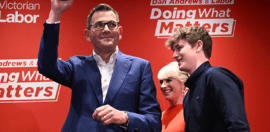‘Trust is the glue that enables collective action for mutual benefit’

24 September 2019 at 8:36 am
Trust in government and politicians is at an all time low, says the director of Democracy 2025, who warns a lack of trust could pose a threat to our democracy.
Speaking at the Philanthropy Meets Parliament Summit in Canberra, Professor Mark Evans said satisfaction with democracy in Australia was now at its lowest level since time series data has been available.
He shared research conducted over the last four years by the Museum of Australian Democracy in partnership with the University of Canberra’s Institute for Governance, that showed just 31 per cent of Australians trust federal government and only 21 per cent trust ministers and MPs.
If current trends continue, by 2025 fewer than one in 10 Australians will trust their politicians and key political institutions.
The research showed there was a significant correlation between distrust and confidence in federal government to perform core tasks, and big policy issues.

Professor Mark Evans.
Evans said while trust was not yet driving direct action – “We’re not seeing a significant upsurge of protest politics in Australia” – creeping economic insecurity might provide the tipping point.
He was emphatic that the question of trust mattered.
“Trust is the glue that enables collective action for mutual benefit; without trust our ability to address complex, long-term challenges is severely constrained,” he said.
“It matters because distrust has led to risk averse short-termist government that is not focused on most of the big public policy problems that Australia is confronting.”
He said trust was even more important in a federated state where collaborative problem solving was fundamental to maintaining nation building efforts.
“And because it undermines Australia’s regional role to lead the defence of liberal democracy at a time when the concept of democracy is under attack worldwide, and particularly in our region,” he said.
The research, included in a new book, From Turnbull to Morrison: The Trust Divide written by Evans and Michelle Grattan, pointed to an increasing public appetite for renewal through civic action.
Nine out of 15 proposed reforms put to Australians received net agreement rates of plus 50 per cent, with reforms aimed at improving the practice of representative politics proving the most popular, followed by reforms aimed at giving citizens a greater say in public policy.
“There was a clarion call both for our politicians to be more accountable, and to do what they say in relation to how we understand liberal democracy, but also a clarion call for more participation and more inclusive governance,” Evans said.
His presentation set the tone for the two-day summit and sparked debate in the panel that followed, leading panellists to question whether the machinery of government was broken and ripe for disruption, making way for a less adversarial and more collaborative political process.
MPs Clare O’Neil and Dave Sharma said their experiences bore out some of the issues Evans had raised and they agreed they were worried about the question of trust.
O’Neil pointed to what she believed was a gap between perceptions and reality on the part of Australians.
She said it was the media’s love of controversy that prevented a lot of work by Parliament being reported, as it is not a matter of conflict between the parties.
But she made a case for changing question time, that was greeted with applause from the audience.
“If we have as a centrepiece of our democracy, a highly conflict ridden situation where routinely behaviour is undertaken that would get you sacked instantly in any other area of work and then we try to go back into our communities as community leaders, it is never going to work,” she said.
Carol Schwartz AO agreed that question time should be changed, and went a step further suggesting that government as a whole was “ripe for renewal and reinvention”.
“We have had the same system of government that has been set up by men for men, for more than 200 years…This is a system which has not been disrupted yet,” Schwartz said.
“It is going to take time because we have a culture of antagonism and argument, but I truly believe if we had 50/50 men and women sitting in Parliament, and within that the diversity that exists…then we would have a different tone and a different culture.”
Glenn Barnes, who drew the audience’s attention to the recently announced inquiry by the Legal and Constitutional Affairs References Committee into nationhood, national identity and democracy, said a lot was working, but that he believed the challenges were threefold.
He argued there was a psychological sense among the community that their views were not being adequately heard and represented by our elected politicians.
He pointed to a behavioural perspective, where “politics takes precedence over policy”. He also said there was a structural problem.
Kerry O’Brien, journalist and chair of The Walkley Foundation, did not hold back in criticising the government.
He said there was a massive failure of political leadership in the country, particularly on issues of climate change, reconciliation and Newstart.
He pointed to an increasing corporatisation of politics, that has seen the job of politics change from being a vocation to more of a career move.
“I think that the nature of the party machines has exercised a negative effect. The kind of groupthink, the giant marketing machine that government seems to become, the increase of risk averseness and the failure to properly debate, these are fundamental,” he said.
But he acknowledged the media was also to blame, pointing to the collapse of traditional models of journalism, the fear in the industry and the stripping away of newsrooms.
He was critical of increasing diminution of media diversity and its capacity to shut down debate.
Evans said the key to rebuilding trust for politicians and the media with the Australian public was to have an open, honest and transparent conversation about it and to build a relationship, which valued their input.
“There is more to democracy that voting every three years…we expect, as with other transactions that we have in our society, to have an ongoing engagement with issues that we care about,” he said.
The panel, moderated by Karen Middleton from the Saturday Paper, saw calls for three year terms to be increased.
It was also generally agreed across the panel that more bipartisanship could go a long way to helping build trust.
The session finished on a note of unanimous support for public funding for elections.








While in complete agreement with O’Briens’ conclusions, one aspect of his analysis needs to be reviewed. He believes a fundamental contribution to the negativity of party machines is “an increase in risk averseness”. Risk management covers a much wider sector than re-election prospects. In this wider field, and particularly in relation to climate change, it is the complete failure of risk management that is leading the Morrison government away from effective policies. Rather than an increase in risk aversion, this government is blind to the very real and very imminent impacts of climate change that is driving us full speed into substantial harm to human health, biodiversity and the loss of our benign environment.